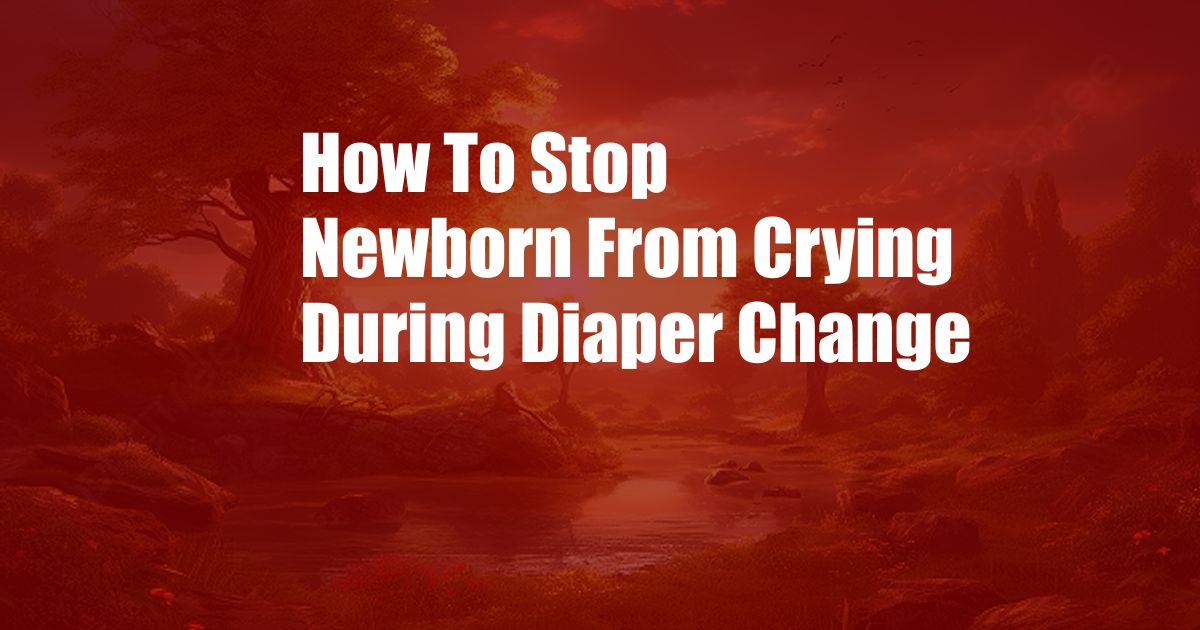
How to Stop a Newborn from Crying During Diaper Changes
As a parent, dealing with a crying newborn during diaper changes can be frustrating and stressful. Their cries can be piercing and relentless, making it difficult to concentrate and change their diaper effectively. However, there are several practical strategies you can implement to help soothe your baby and make diaper changes a less stressful experience.
Understanding why your baby is crying during diaper changes is the first step in preventing it. Common reasons include hunger, wet or dirty diapers, discomfort due to gas or colic, or simply feeling cold or uncomfortable. Once you identify the underlying cause, you can tailor your approach accordingly.
Creating a Calming Environment
Establishing a calming and comfortable environment for diaper changes can make a significant difference. Ensure the room is warm and well-lit, and avoid making sudden noises or movements that may startle your baby. You can also create a soothing atmosphere by playing soft music or singing to your little one.
If possible, change your baby’s diaper on a soft and comfortable surface, such as a changing table or a bed covered with a soft blanket. This will help minimize discomfort and provide a safe and cozy space for your baby.
Gentle Handling and Communication
When changing your baby’s diaper, handle them gently and communicate with them throughout the process. Talk to them in a soft and soothing voice, and let them know what you’re doing. This helps them feel secure and less anxious.
Avoid rushing through the process, as this can make your baby feel overwhelmed. Take your time and make each step as gentle as possible. If your baby starts to fuss, stop what you’re doing and try to soothe them by rocking them or singing to them. This will help them calm down and make the diaper change less stressful.
Diapering Techniques
Using the correct diapering techniques can also help reduce crying during diaper changes. Ensure that the diaper is not too tight or too loose, as this can cause discomfort. Position your baby on their back with their legs elevated to minimize gas and colic.
When wiping your baby’s bottom, use soft and gentle wipes. Avoid using harsh chemicals or scented wipes that may irritate their delicate skin. If your baby has a diaper rash, apply a thin layer of diaper cream to help soothe the irritation.
Addressing Underlying Causes
If your baby consistently cries during diaper changes, it’s important to identify and address any underlying causes. If hunger is an issue, feed your baby before changing their diaper. If gas or colic is a concern, try burping your baby or giving them a gentle tummy massage before changing their diaper.
If you cannot identify the cause of your baby’s crying, consult your healthcare provider. They can assess your baby’s health and offer professional advice to help you manage diaper changes effectively.
FAQs
Q: Why does my baby cry during diaper changes?
Common reasons include hunger, wet or dirty diapers, discomfort due to gas or colic, or feeling cold or uncomfortable.
Q: How can I create a calming environment for diaper changes?
Ensure the room is warm and well-lit, avoid making sudden noises or movements, and consider playing soft music or singing to your baby.
Q: What are some gentle diapering techniques I can use?
Handle your baby gently, position them on their back with their legs elevated, and use soft and gentle wipes. Avoid using harsh chemicals or scented wipes.
Q: What should I do if my baby consistently cries during diaper changes?
Try to identify the underlying cause, such as hunger or discomfort. If you cannot identify the cause, consult your healthcare provider for professional advice.
Conclusion
By following these strategies and tips, you can help soothe your newborn and make diaper changes a less stressful experience for both of you. Remember to be patient, gentle, and communicate with your baby throughout the process. If you have any concerns about your baby’s crying, do not hesitate to consult your healthcare provider for guidance.
Are you interested in learning more about newborn care and parenting tips? Check out our other informative blog articles for valuable insights and practical advice.